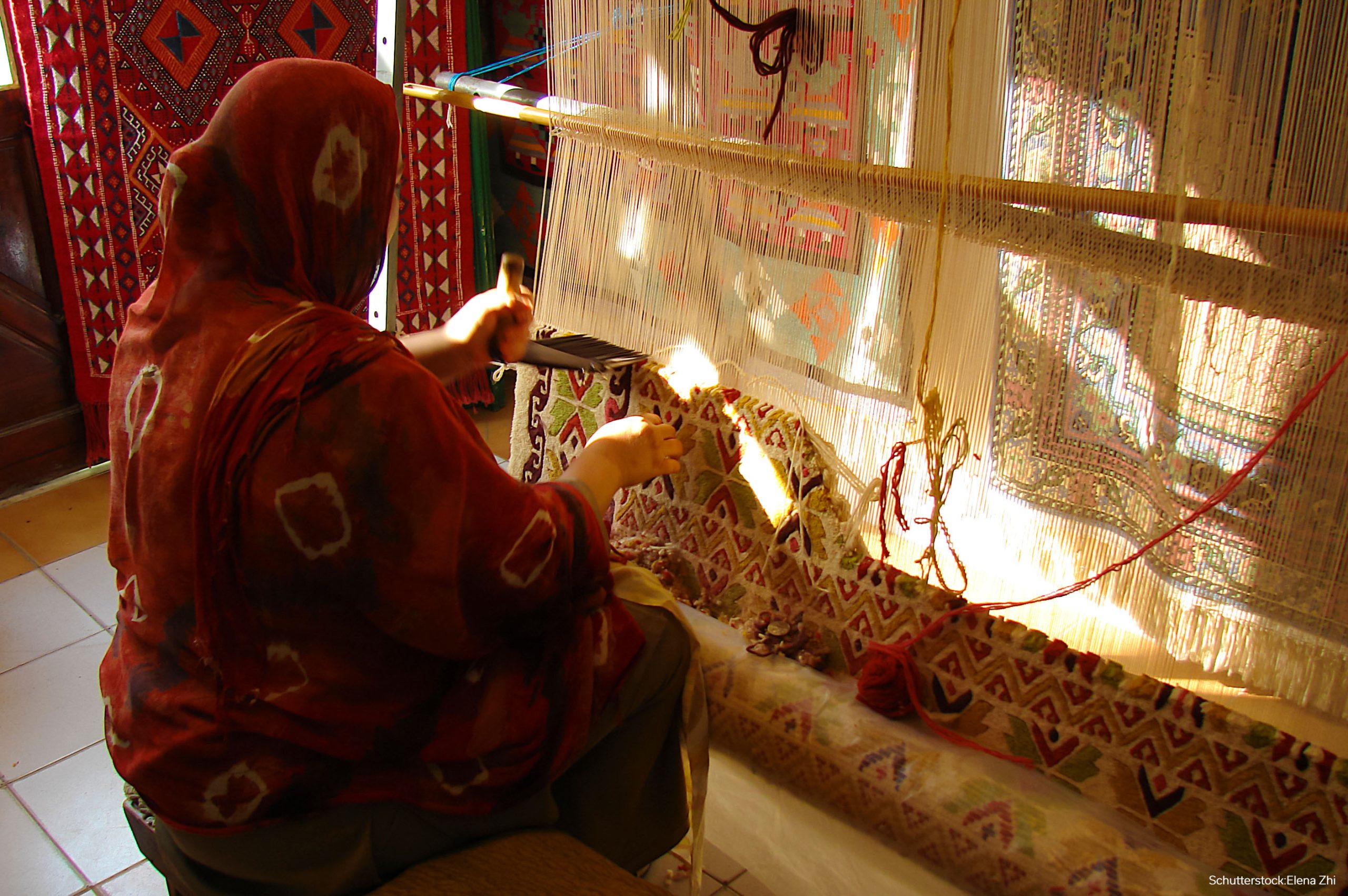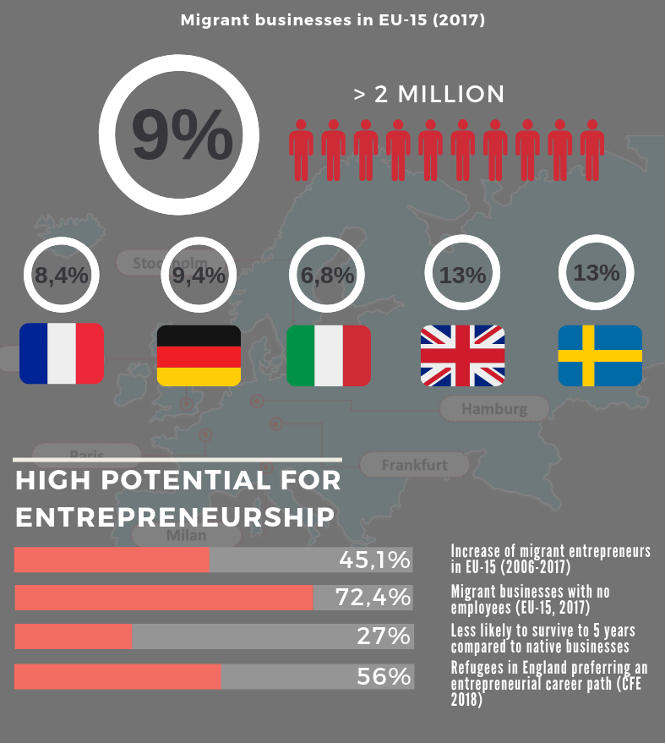
Read more
Blog, Labour markets & welfare states
What role have employers had in Italian migration policy-making? A behind the scenes analysis
Italy has changed its migration laws several times over the years. Who’s influenced the legislative process? Employers. From the introduction of the Foschi Law in 1986 to the Bossi-Fini Law in 2002, a series...
On the surface, a wide range of organizations and institutions are in favour of promoting migrant businesses. Cities, regions, countries, the European Commission, and corporations all agree that migrant-owned business help the inclusion of migrants, socially as well as economically. If so many institutions and actors agree, why is it still so difficult for migrants to start and grow their own businesses in Europe? How can we make it easier? One answer is a coalition of four key actors, what I call a “quadrumvirate”.
The Case for Migrant Entrepreneurship
Two major projects on migrant entrepreneurship – the Migrant Entrepreneurship Growth Agenda and the Newcomer Entrepreneurship Support project – found that migrant enterprises promote economic development as well as social inclusion.
Economic development
- Micro (<10 employees) and small (10-50) enterprises generate most new jobs in Europe – and businesses owned and run by migrants make up a growing proportion of new micro and small enterprises.
- Migrant businesses give migrants an economic future and a way to be economically independent.
- They create wealth for the cities they live in rather than becoming a burden.
- These businesses introduce new products and services. As micro and small businesses, they are quick and agile and can offer bespoke and tailored services.
- Many cities, regions and countries are facing labour and supply chain shortages. Migrant businesses fill these gaps.
Social Inclusion
- Migrant businesses help migrants feel like they belong in and can contribute to their new society.
- These businesses embed migrants in the host community and help host communities see value in having migrants.
- Added to all of this, the EU is committed to tackling discrimination and integrating migrants.
In other words, promoting migrant entrepreneurship is in many ways an uncontroversial campaign to get behind. It seems like a no-brainer, right?
Figure: Migrant Businesses in EU-15 (2017)
Note: Statistics compiled by Migration Policy Group as part of the Newcomers Entrepreneurship Support project.
Challenges Facing Migrant Enterprises in Europe
Yet, the Migrant Entrepreneurship Growth Agenda and Newcomer Entrepreneurship Support projects both found that migrant businesses continue to struggle with specific challenges which remain unaddressed.
Migrant-owned enterprises often lack language, business, digital, and financial management skills. These businesses are more likely to not understand the legal requirements of their new country. Migrant business owners often lack professional and personal confidence. Sometimes migrant entrepreneurs’ skills and education are not recognised by their new country. Many do not have contacts in the mainstream business community. These enterprises often find it difficult to get access to finance, such as bank loans, and rely on support from their own migrant communities, which is usually limited. And to make matters worse, most migrant-owned businesses were hit harder by COVID then mainstream businesses, for the reasons above and because they mostly work in sectors that involve face-to-face business-to-customers relations, and so could not easily move online.
A Quadrumvirate for Supporting Migrant Enterprises
One mechanism to address the challenges migrant businesses face is a quadrumvirate, of (1) migrant businesses, (2) support services organizations (such as incubators and accelerators), (3) corporations, and (4) government (at all levels). Working together, these four groups can build an eco-system to support migrant entrepreneurs.
For example, both projects found that these four sets of actors need to work together to deliver concrete, comprehensive and adequately funded policies and initiatives. Specifically, these policies and initiatives need to focus on and create:
- visibility of migrant businesses’ wider contribution, and greater visibility of migrant business support services;
- language and cultural sensitivity within business support services to migrants, including multilingual information and outreach to communities;
- legal and regulatory advice on setting up and running a business, geared to the specific needs of (newly arrived) migrant entrepreneurs including language and residency aspects;
- Individual business support for migrant entrepreneurs, advising them on the entire business cycle from development of business ideas and plans to the start-up and growth phase;
- mentoring through experienced entrepreneurs, to support skill and knowledge development and to provide role models; including effective mentor/mentee matching procedures;
- access to finance for potential and established migrant businesses, including obstacle-free access to credit from mainstream loaning institutions as well as alternative funding sources;
- provision of facilities and incubating services for example, immigrant-run start-ups or one-person businesses that lack working space and technical infrastructures and
- data gathering, impact assessment and evaluation of measures to improve the knowledge base on migrant entrepreneurship and better inform policies supporting it.
An example the quadrumvirate in action is the work of the NyföretagarCentrum (NFC) which is a Swedish NGO founded collaboratively by industrial companies, partners from the financial sector, the employers’ federation as well as labour organisations. NFC focuses on helping micro and small entrepreneurs, including those that are migrant-owned. NFC works with actors from different sectors to provide a range of services, which include: personalised counselling and mentoring, expert advice, business plan development support, ad-hoc business training, assistance with loan packaging by recommending entrepreneurs to cooperating banks and micro-finance institutions, a network ecosystem, with partners and support from private industry, civil society, and government at state and local levels. For further information, see the NFC Toolkit .
This is a big agenda, but fortunately several excellent organizations are working on it and there is growing realisation that migrant business, support services, corporations, and governments need to work together. Migrant-owned businesses are often overlooked, yet are vital for Europe’s economic growth as well as social and economic inclusion of new migrant communities in our societies. We need to work together to unlock their potential, and new projects, like MEGA and NES, are showing the way forward.
For more information on this topic see these other projects and organizations:
MIG.EN.CUBE is a project that focuses on enhancing the knowledge and competences of diverse incubation professionals who deal with current or aspiring migrant entrepreneurs.
Migration Policy Group (MPG) is a think-and-do-tank based in Brussels with a focus on integration, migration and anti-discrimination.
Migration Policy Institute (MPI) seeks to improve immigration and integration policies through authoritative research and analysis, opportunities for learning and dialogue, and the development of new ideas to address complex policy questions.
the SPRING Project European integration professionals share information on knowledge gaps and needs of organisations working on integration
TERN is a not for profit which enables refugees to thrive through the power of their own ideas.
The Human Safety Net seeks to integrate refugees through work and entrepreneurship.
The Refugee Entrepreneurship Network (TERN) is a global community working to improve the scale and impact of refugee entrepreneurship programmes. It brings together practitioners, philanthropic foundations, researchers, corporates and investors.
UP Collective is a joint project of Ben & Jerry’s and TERN, which works with people to develop their business ideas along with entrepreneurship training, mentoring and part-time employment.



